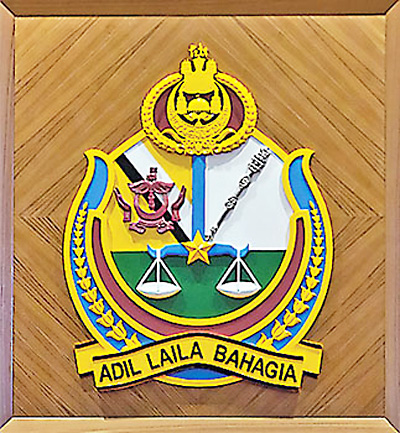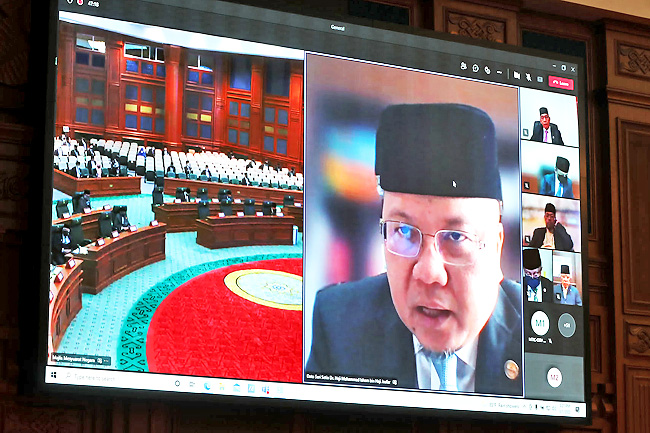Izah Azahari
A BND391,937,883 budget allocated to the Ministry of Health (MoH) was unanimously passed by Legislative Council (LegCo) members for the financial year 2022/2023 during the fifth day of the 18th LegCo session yesterday.
The allocated budget is a 1.2-per-cent increase from BND387,211,117 in the financial year 2021/2022.
The proposed budget was delivered by Minister of Health Yang Berhormat Dato Seri Setia Dr Haji Mohd Isham bin Haji Jaafar who said the bulk of the allocation is to finance staff salaries at 58.3 per cent, while the remainder is for recurring expenditures at 41.7 per cent, and development expenditure at 1.5 per cent.
Yang Berhormat Dato Seri Setia Dr Haji Mohd Isham said the country’s investment in the health sector – although small when based on the rate of gross domestic product (GDP) and low compared to other countries – is at a good level when judged from the health status of people, especially under the sustainable development goals (SDGs) related to health through vital indicators such as low infant mortality rate, maternal mortality rate during childbirth, and prevalence of infectious diseases such as HIV, and high life expectancy rates, universal health coverage index, antenatal and immunisation care coverage and treatment for TB.
“A dynamic and resilient health system needs to be emphasised to ensure that the people are able to develop the country towards a sustainable socio-economy and rapid growth and development,” he said.
The minister said the restrengthening of the health system affected by COVID-19 will be the Ministry of Health’s (MoH) main focus as it is a pillar to the continuity of life-long healthcare services.


Yang Berhormat Dato Seri Setia Dr Haji Mohd Isham said the MoH’s budget for the financial year 2022/2023 is to re-emphasise and improve the MoH’s main values and core business activities, which include aspects of patient care, prevention of communicable and non-communicable diseases, and the delivery of the best medical services to the public, in line with the implementation of initiatives under the MoH Strategic Plan 2019-2023.
“The budget’s theme for the financial year 2022/2023 is ‘A Dynamic and Resilient Health System’,” the minister said, adding that to achieve the goal, priorities will be given to the delivery of the best, professional and empowered medical services; emphasis on initiatives related to early prevention, especially the screening programme for non-communicable diseases; ensuring the effective use of resources or assets includes more prudent spending, the use of existing infrastructure by giving priority to its conservation and the maintenance of medical equipment in a timely manner; implement innovation in service delivery by taking advantage of the development of medical technology in the era of Industrial Revolution 4.0 and aligning it with the Digital Economy Master Plan 2025; prioritising efforts to address mental health issues; and contributing to increasing government revenue through more efficient and continuous management of revenue collection and examining medical costs to reduce government subsidies to foreign workers who should already be covered by mandatory health insurance.
In line with the theme, the minister shared that the MoH aspires to make the health sector a contributor to the national economy, as well as to create a conducive environment for the development of the medical and health industry, which includes the development of the medical industry, professional manpower, specialised medical services, infrastructure investment, research, medical technology and digital transformation in healthcare in the long run.
The minister said the MoH’s strategic plan 2019-2023 continues to be a roadmap for the implementation of medium-term initiatives. Some 70 per cent of the strategic initiatives had been implemented in the stipulated time frame until December 2021. “It is a commitment of the MoH to provide services that are responsive to public needs so the people can enjoy a high quality of life in line with the strategic goals of Brunei Vision 2035,” the minister added.
He said improvements to medical and health services will continue to be made while ensuring the continuity of essential services that are always accessible to citizens and residents, adding that the development of the service over the past five years has shown encouraging progress.
Looking back on the financial year 2021/2022, the minister said several developments were seen, especially in the improvement of clinical services such as the addition of dialysis units for kidney patients operated together with the Jerudong Park Medical Centre (JPMC), the transfer of the 991 Call Centre to Raja Isteri Pengiran Anak Saleha (RIPAS) Hospital and the increase in ambulances, improvement of audiology services especially in the newborn hearing screening programme for early intervention of hearing problems so children have the opportunity to enjoy a good quality of life.
The minister also noted the construction of the Clinical Molecular Diagnostic Laboratory for Infectious Disease in Tutong District which supports the MoH’s strategic goal of ensuring national preparedness in tackling infectious diseases and ensuring public health safety in the country. The country’s ability to conduct genomic sequencing tests in identifying COVID-19 variants is another recent achievement that was realised through collaboration with the private sector, elevating the capacity in dealing with public health emergencies, especially in carrying out diagnostic tests during the COVID-19 outbreak.
The minister said the Recovery Framework for the new norms must be implemented as best as possible as it has been carefully compiled to preserve the well-being of the country as well as the people and residents of the country, along with other plans made earlier.
“We hope for support and cooperation from all parties just as we united and worked together as a whole nation when fighting the epidemic of the first COVID-19 wave,” the minister said, noting that the Sultanate being in the Endemic Phase, a complete decline in cases of infection will not be possible as long as COVID-19 is still circulating around the world.


